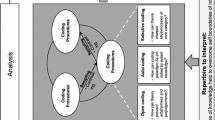Abstract
Philosophical discussion of the general methodology of qualitative research, such as that used in some health research, has been inductivist or relativist to date, ignoring critical rationalism as a philosophical approach with which to discuss the general methodology of qualitative research. This paper presents a discussion of the general methodology of qualitative research from a critical rationalist perspective (inspired by Popper), using as an example mental health research. The widespread endorsement of induction in qualitative research is positivist and is suspect, if not false, particularly in relation to the context of justification (or rather theory testing) as compared to the context of discovery (or rather theory generation). Relativism is riddled with philosophical weaknesses and hence it is suspect if not false too. Theory testing is compatible with qualitative research, contrary to much writing about and in qualitative research, as theory testing involves learning from trial and error, which is part of qualitative research, and which may be the form of learning most conducive to generalization. Generalization involves comparison, which is a fundamental methodological requirement of any type of research (qualitative or other); hence the traditional grounding of quantitative and experimental research in generalization. Comparison—rather than generalization—is necessary for, and hence compatible with, qualitative research; hence, the common opposition to generalization in qualitative research is misdirected, disregarding whether this opposition’s claims are true or false. In conclusion, qualitative research, similar to quantitative and experimental research, assumes comparison as a general methodological requirement, which is necessary for health research.
Similar content being viewed by others
References
Agassi, J. (1975). Science in flux. Dordrecht: Reidel.
American Psychiatric Association. (2000). Diagnostic and statistical manual of mental disorders (4th ed text-revised). Washington, DC: American Psychiatric Association.
Bandura, A. (1976). Social learning theory. Upper Saddle River, NJ: Prentice Hall.
Bonk, T. (2008). Underdetermination: An essay on evidence and the limits of natural knowledge. Dordrecht: Springer.
Boyatzis, R. E. (1998). Transforming qualitative information: Thematic analysis and code development. Thousand Oaks, CA: Sage.
Bryant, A., & Charmaz, K. (Eds.). (2010). The SAGE handbook of grounded theory. Thousand Oaks, CA: Sage.
Creswell, J. W. (2007). Qualitative inquiry and research design: Choosing among five approaches (2nd ed.). Thousand Oaks, CA: Sage.
Creswell, J. W. (2008). Research design: Qualitative, quantitative, and mixed methods approaches (3rd ed.). Thousand Oakes, CA: Sage.
Davidson, L. (2003). Living outside mental illness: Qualitative studies of recovery in schizophrenia. New York: New York University Press.
Harding, S. (Ed.). (1976). Can theories be refuted? Essays on the Duhem-Quine thesis. Dordrecht: Springer.
Kekes, J. (1980). The nature of philosophy. Oxford: Blackwell.
Miller, D. (1994). Critical rationalism: A restatement and defence. Chicago, IL: Open Court.
Miller, D. (2006). Out of error: Further essays on critical rationalism. Aldershot, UK: Ashgate.
Morse, J., & Field, P. A. (1995). Qualitative research methods for health professionals. Thousand Oaks, CA: Sage.
Popper, K. R. (1957). The poverty of historicism. London: Routledge & Kegan Paul.
Popper, K. R. (1959). The logic of scientific discovery. London: Hutchinson.
Popper, K. R. (1963). Conjectures and refutations: The growth of scientific knowledge. London: Routledge & Kegan Paul.
Reichenbach, H. (1938). Experience and prediction. Chicago: Chicago University Press.
Rudnick, A. (2003). Paranoia and reinforced dogmatism: Beyond critical rationality. Philosophy of the Social Sciences, 33, 339–350.
Schickore, J., & Steinle, F. (Eds.). (2006). Revisiting discovery and justification: Historical and philosophical perspectives on the context distinction. Dordrecht: Springer.
Stamp Dawkins, M. (2007). Observing animal behaviour: Design and analysis of quantitative data. Oxford: Oxford University Press.
Yehezkel, G. (2005). A model of conceptual analysis. Metaphilosophy, 36, 668–687.
Acknowledgments
The author declares no conflict of interests with respect to the authorship and/or publication of this article.
Conflict of interests
The author received no financial support for the research and/or authorship of this article.
Author information
Authors and Affiliations
Corresponding author
Rights and permissions
About this article
Cite this article
Rudnick, A. A Philosophical Analysis of the General Methodology of Qualitative Research: A Critical Rationalist Perspective. Health Care Anal 22, 245–254 (2014). https://doi.org/10.1007/s10728-012-0212-5
Published:
Issue Date:
DOI: https://doi.org/10.1007/s10728-012-0212-5




